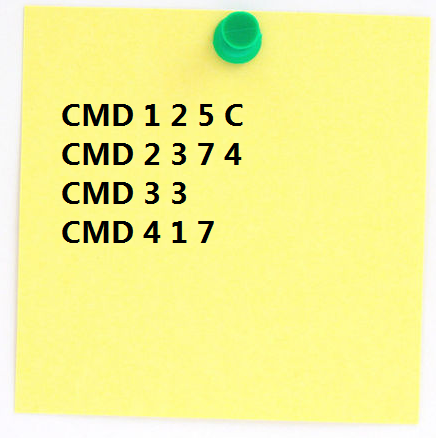Combination Lock
描述


Finally, you come to the interview room. You know that a Microsoft interviewer is in the room though the door is locked. There is a combination lock on the door. There are N rotators on the lock, each consists of 26 alphabetic characters, namely, 'A'-'Z'. You need to unlock the door to meet the interviewer inside. There is a note besides the lock, which shows the steps to unlock it.
Note: There are M steps totally; each step is one of the four kinds of operations shown below:
Type1: CMD 1 i j X: (i and j are integers, 1 <= i <= j <= N; X is a character, within 'A'-'Z')
This is a sequence operation: turn the ith to the jth rotators to character X (the left most rotator is defined as the 1st rotator)
For example: ABCDEFG => CMD 1 2 3 Z => AZZDEFG
Type2: CMD 2 i j K: (i, j, and K are all integers, 1 <= i <= j <= N)
This is a sequence operation: turn the ith to the jth rotators up K times ( if character A is turned up once, it is B; if Z is turned up once, it is A now. )
For example: ABCDEFG => CMD 2 2 3 1 => ACDDEFG
Type3: CMD 3 K: (K is an integer, 1 <= K <= N)
This is a concatenation operation: move the K leftmost rotators to the rightmost end.
For example: ABCDEFG => CMD 3 3 => DEFGABC
Type4: CMD 4 i j(i, j are integers, 1 <= i <= j <= N):
This is a recursive operation, which means:
If i > j: Do Nothing Else: CMD 4 i+1 j CMD 2 i j 1For example: ABCDEFG => CMD 4 2 3 => ACEDEFG
输入
1st line: 2 integers, N, M ( 1 <= N <= 50000, 1 <= M <= 50000 )
2nd line: a string of N characters, standing for the original status of the lock.
3rd ~ (3+M-1)th lines: each line contains a string, representing one step.
输出
One line of N characters, showing the final status of the lock.
提示
Come on! You need to do these operations as fast as possible.
- 样例输入
-
7 4 ABCDEFG CMD 1 2 5 C CMD 2 3 7 4 CMD 3 3 CMD 4 1 7
- 样例输出
-
HIMOFIN